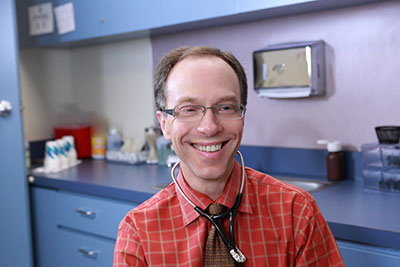Well-Child Checkups
Before and After Your Baby is Born
 If you would like to meet us in person before your baby is born, we’re happy to schedule a complimentary meet-and-greet visit. This is a great way to get to know your pediatrician and share any important prenatal information. You might also have a lot of questions. We’re here for you! Feel free to ask us about childbirth, circumcision, breastfeeding/chestfeeding, belly buttons or anything else.
If you would like to meet us in person before your baby is born, we’re happy to schedule a complimentary meet-and-greet visit. This is a great way to get to know your pediatrician and share any important prenatal information. You might also have a lot of questions. We’re here for you! Feel free to ask us about childbirth, circumcision, breastfeeding/chestfeeding, belly buttons or anything else.
Once your baby is born at your hospital, birth center or home, please call and let us know! We would like to see your baby in clinic in the first 3 days of life.
Childhood Preventative Care Schedule
Typically children see us on the following schedule:
- When they’re first born
- 2 weeks
- 1 month
- 2 months
- 4 months
- 6 months
- 9 months
- 12 months
- 15 months
- 18 months
- 2 years (24 months)
- 2½ years (30 months)
- 3 years (36 months)
- Each year after 3 until age 21
Adolescence and Beyond
As children reach adolescence, they require a different approach to healthcare. We use the following guidelines to ensure the best care for your adolescent's changing needs:
- Your adolescent completes a developmental/behavioral screening tool before seeing the physician. This form screens for learning, emotional and behavioral problems so we can recommend interventions as early as possible.
- A member of the nursing staff brings your adolescent to the exam room for measurements and other information. You are welcome to accompany your child during this portion of the visit.
- With a physician present, you and your child will have a chance to discuss overall health and any other concerns.
- After this, we will recommend that you return to the waiting room to give your adolescent 1-on-1 time with the physician, in order to respect privacy, build trust and encourage honest communication. You may return to the exam room for the end of the visit, if needed.
What the doctor discusses alone with your adolescent remains private unless they wish to share the conversation with you, or the doctor feels the health of your adolescent or someone else is in danger.
We will let your adolescent know what concerns are discussed together. We always encourage both adolescents and their caregivers to call our office with any questions.
A chaperone or family member present for the exam can be requested.
We will continue to discuss your adolescent’s health, ensure your understanding of our plans and encourage your support and participation.
We are happy to provide a medical home for your adolescent through college and assist with the transitioning to an adult healthcare provider.
Special Provisions for Minors Under Washington Law
As described below, Washington state laws allow teens to consent to certain kinds of healthcare and give them privacy rights related to that care. To provide the best care and comply with those laws, we may need to talk with your teen in private.
We talk with teens in private when necessary to comply with the laws mentioned above. If a teen chooses to keep the information they disclose private from their parents/legal guardians, and it falls within an area of healthcare that they are old enough to consent to on their own under Washington state law, then we will not share it with their parents/legal guardians. Disclosures about being suicidal, or any similar life-threatening information, will not be kept private from a teen’s parents/legal guardians.
- Mental health: A teen who is 13 or older may give consent for inpatient or outpatient care and treatment for mental health concerns. If a teen needs psychiatric treatment and refuses to consent for care, a parent, legal guardian or other adult identified by statute can consent for the teen to receive inpatient or outpatient care. In certain situations when a teen needs care and treatment and cannot be admitted through their consent or the consent of a parent, legal guardian or other adult identified by statute, a provider can make a referral for evaluation for inpatient admission under Washington state’s Involuntary Commitment Act.
- Sexually transmitted infections: A teen who is 14 or older may consent for care and treatment for a sexually transmitted infection (STI). This includes testing and treatment that is done in a hospital or clinic.
- Substance abuse: A teen who is 13 or older may give consent for outpatient substance use evaluation and treatment at a licensed substance abuse treatment center in Washington state without consent from a parent or legal guardian.
- Reproductive health: Minors may give consent for reproductive health services without consent from a parent or legal guardian.
Visit our Community Resources for links to information about teen health. Also, know that we are here for you to answer any questions about this time of transition and connect you with resources as needed.
